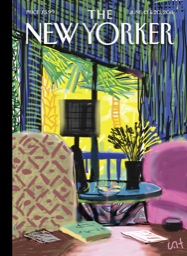>
June 13 & 20, 2011: “Above and Below” by Lauren Groff
The last of the three stories in the Summer Fiction issue is “Above and Below” by Lauren Groff. (Groff has a novel coming out but I gather from the interview that this isn’t excerpted from it.) I want to say it’s the best of the three, but they’re all so different that I guess I won’t say that, and, despite all its great strengths, I thought it went on a little long and I’m a little unclear as to what it’s about.
The story is a classic “hero goes on a journey” story, but with the twist that she doesn’t get very far. What’s also a bit unusual here is the episodic nature of the piece—she has one experience after another, each unrelated to the next. They accumulate, certainly, but it’s almost as if they are their own little stories within the framework of the whole: the squat at the end; the tent city with the woman and her kids; the cleaning job with Euclid; and so on. (There are links, actually, but they’re more psychological than plot-related.)
But the plot: a woman in graduate school who grew up quite poor (and has issues with her distracted mother), has broken up with her boyfriend and when she loses university funding her fragile finances crumble. She moves what few belongings she can in her old station wagon and hits the road—bound for where she doesn’t know. She finds various ways to survive. She showers in the gym of a beachside condo complex. She gets food from a church “soup kitchen.” She goes dumpster diving. When she finds a five dollar bill (how convenient!) she goes to a bar and lets herself get picked up by a guy and after he falls asleep she raids his refrigerator. When her car gets stripped, she’s even more homeless, but she stumbles upon a job cleaning nightclubs which lasts for a while until her boss, Euclid, has a stroke. She winds up in a tent city of homeless people watching the kids of a single mother who works in a fast food joint—until she gets fired and then arrested for prostitution. So she winds up back at the campus where she started and stumbles upon people scavenging discarded furniture from campus housing, and she hooks up with them, winding up in a Prairie House that is a “squat,” the kitchen of which she cleans, using the skills she acquired during her short-lived cleaning gig.
The whole story has been to get us to this house where she wanders into the prairie, feeling incredibly alone but also aware of the teeming life there: “There was no relief in the sky vaguely filmed with stars, a web vaster than she could imagine. There was nobody who could save her, nobody who could deliver her gently back to the solace of people.”
And then, a jump forward in time to the difficult birth of her daughter, which brings back the memory of that night on the prairie, and then this: “How delicate the things that tie us to one another. The hands in her flesh, her own crossed on her chest, her daughter’s tiny fists drawn up into the air.” This is, I suppose, the link between mother and daughter, the link that was broken with her own mother, the link that was broken with all people. [I don’t get the hands crossed on her chest, though; that makes me think she’s dead, although that wouldn’t happen until she’s placed in a coffin, so surely that’s not right.]
Reactions?


>I found this story to be so beautiful I was sorry when it ended. I see it as a story about poverty and the fragile line between a normal life and being almost too poor to exist. The ending startled me and I found it abrupt, but in a good way because I felt a sense of relief that this episode in the character's life eventually ended and became something she could look back on from a safer place. But the point is made: many people have no safety net. I loved this story.
>I live in Gainesville, work Downtown and have seen those who "live in their cars" at the beach and so the context is familiar to me. What struck me about the story, and I realized it as soon I finished, was the distance I have placed between me and those real life characters I on a daily basis. The story will help me see their world in in it's human context for sure and may even make me become a better person as a result! Thanks
>I liked “Above and Below” but I found the ending very abrupt. It felt to me like the author had said “Enough!” and just tacked the ending on. The story actually reminded me of “Wakefield” written by E.L. Doctorow. That was also a “journey” story, but I felt the “logic” of the journey made more sense. And the ending was brilliant!
Of the three stories in the Summer Fiction Issue I enjoyed “Asleep in the Lord” the most. Although you point out that it isn’t actually a short story, but part of a novel.
I couldn’t finish “Home” by George Saunders. The story is almost entirely dialogue – lots and lots of dialogue – and I tend to like my fiction with a mix of dialogue and exposition. But based on your review I may reconsider.